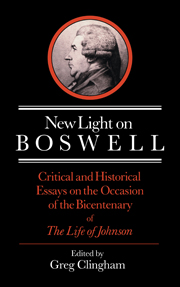 New Light on Boswell
New Light on Boswell Book contents
- Frontmatter
- Contents
- Notes on contributors
- Preface
- Acknowledgements
- Abbreviations
- 1 Introduction: Boswell's ambiguities
- Part I BOSWELL AND EIGHTEENTH-CENTURY SCOTTISH CULTURE
- Part II CONTEXTS FOR THE LIFE OF JOHNSON
- 6 Boswell's liberty-loving Account of Corsica and the art of travel literature
- 7 Boswell and sympathy: the trial and execution of John Reid
- 8 Boswell and Hume: the deathbed interview
- 9 “This Philosophical Melancholy”: style and self in Boswell and Hume
- Part III THE LIFE OF JOHNSON RECONSIDERED
- Index
7 - Boswell and sympathy: the trial and execution of John Reid
Published online by Cambridge University Press: 28 October 2009
- Frontmatter
- Contents
- Notes on contributors
- Preface
- Acknowledgements
- Abbreviations
- 1 Introduction: Boswell's ambiguities
- Part I BOSWELL AND EIGHTEENTH-CENTURY SCOTTISH CULTURE
- Part II CONTEXTS FOR THE LIFE OF JOHNSON
- 6 Boswell's liberty-loving Account of Corsica and the art of travel literature
- 7 Boswell and sympathy: the trial and execution of John Reid
- 8 Boswell and Hume: the deathbed interview
- 9 “This Philosophical Melancholy”: style and self in Boswell and Hume
- Part III THE LIFE OF JOHNSON RECONSIDERED
- Index
Summary
Boswell's account in his journals and legal records of his passionate but unsuccessful defense, in Edinburgh's High Court of Justiciary in August 1774, of an accused sheep-stealer named John Reid documents the most intense of his several engagements with capitally condemned criminals. His report of the trial and its aftermath – in which Boswell worked frantically to gain Reid a reprieve and even devised a plan, perfectly serious and abandoned only at the last minute after many of the preparations had been made, to make off with Reid's body after the hanging and attempt to revive it – provides his diary with the longest, most detailed, and most self-revealing of his criminal narratives. After this defeat, though he would labor at the law for many years more, Boswell made a critical emotional swerve away from the Whig, Lowland, Presbyterian Scotland embodied most notably, in this context, by his father, Lord Auchinleck, one of the judges in the cause who sent John Reid to the scaffold: a swerve away, that is, from the ethos of the Edinburgh judicial establishment, in which language had the capacity to incarcerate and destroy, into fulfillment of his ambitions instead to be a biographer, to enter a world in which language might sustain human significance by conferring a textual immortality. Part of Boswell died with Reid: it was defeat in this cause which, in Frank Brady's words, “crystallized his distaste for the Scottish bar” and “destroyed his momentum as a lawyer.”
- Type
- Chapter
- Information
- New Light on BoswellCritical and Historical Essays on the Occasion of the Bicententary of the 'Life' of Johnson, pp. 104 - 115Publisher: Cambridge University PressPrint publication year: 1991


